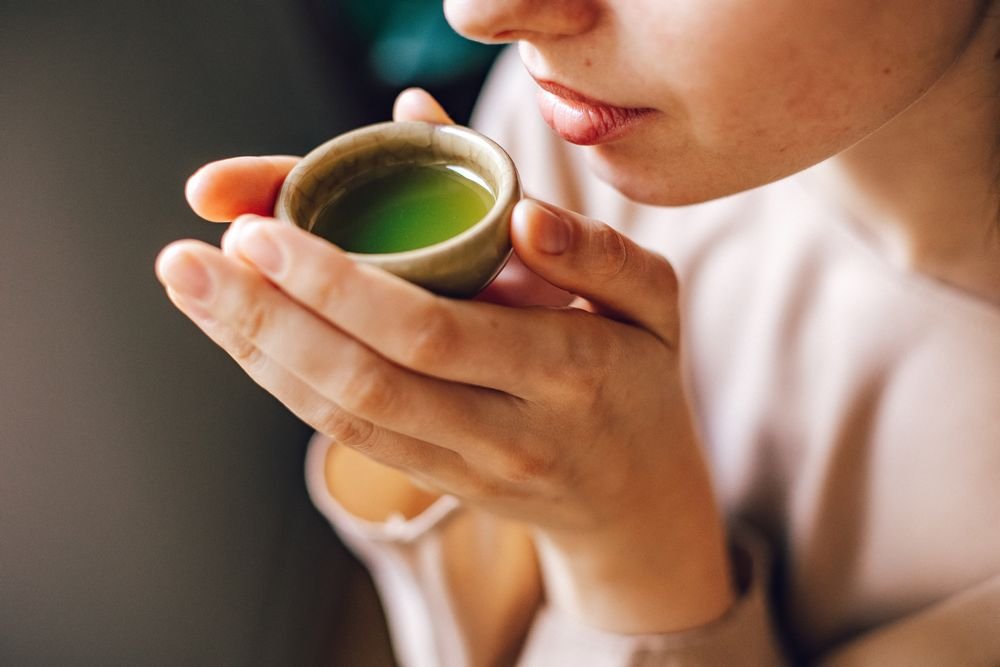
But there are also some matcha side effects you need to know about.
They can hit some people pretty hard.
People with certain health conditions need to be especially careful.
Of course, I don’t want to scare you. Matcha is perfectly fine for most people (in moderation)
But you do want to make sure you know about the potential side effects. So keep reading to find out everything you need to know.
Table of Contents
Matcha Side Effects
Matcha has the potential to cause a number of side effects. Most people will never experience these, but you still need to know about them, just in case.
And if you do experience any, limit your matcha intake to a cup or two per day. That should take care of it. It is also a good idea to see a doctor, especially if the side effects are severe.
Could Cause Insomnia

One of the main side effects of matcha is that it can cause insomnia in some people. This is mainly due to its caffeine content.
Caffeine acts as a stimulant, which makes it harder for some people to fall asleep. Caffeine blocks adenosine receptors in the brain (adenosine is a sleep-inducing chemical). Studies have shown that caffeine could lower sleep efficiency by 5%.
Furthermore, matcha’s caffeine content also reduces 6-sulfatoxy-melatonin, which is a key melatonin metabolite. Melatonin is a sleep-inducing hormone.
To prevent this matcha side effect, limit your intake of the tea to the earlier part of your day. You may also want to limit your matcha consumption to no more than 2 to3 cups per day.
May Increase Blood Sugar Levels
Another side effect of matcha is that it could affect blood sugar levels. Matcha’s caffeine content influences how the human body responds to insulin. In some individuals, it may decrease insulin sensitivity, lower the cells’ ability to absorb sugar and increase blood sugar levels.
In diabetics, especially those with type-2 diabetes, the body is already unable to use the insulin hormone properly. With excessive matcha intake, blood sugar levels may rise above normal.
In extreme cases, this high blood sugar can result in complications, including heart disease, nerve damage, etc. To prevent this side effect of matcha, diabetics must limit their matcha consumption and should also consult their physician for personalized advice.
May Cause An Upset Stomach Or Diarrhea

Matcha is known to cause an upset stomach in some people. There are a number of reasons for this.
First, matcha contains caffeine, which acts as a mild laxative. This laxative effect can result in stomach discomfort and abdominal pain. It can also lead to frequent bathroom trips in some sensitive individuals.
Second, matcha is rich in fiber, which, in excess, can result in diarrhea and loose stools.
Third, matcha, like all teas, contains tannins. Tannins are compounds known to irritate the stomach lining, increase gastric acids, and result in acidity and stomach upset. Additionally, matcha’s diuretic effect can lead to fluid loss, which often manifests as diarrhea.
To minimize stomach upset, limit your matcha intake. You could also consider having matcha with your meals or with a light snack.
Always stay adequately hydrated to prevent fluid loss. In most cases, these symptoms should reduce as your body gets used to matcha. However, if you experience persistent discomfort, do consult your healthcare professional for personalized advice.
Could Result In Nausea
Matcha can result in nausea in some people, especially if they drink it on an empty stomach. The caffeine in matcha is known to trigger acidity, resulting in a queasy feeling.
To prevent this side effect, avoid drinking matcha on an empty stomach. You can have it with a small snack, like a sweet treat or crackers, to cushion its impact on your stomach.
Also, limit your matcha consumption to 1 to 2 cups per day. This will further reduce the likelihood of nausea. Always listen to your body and adjust your matcha intake to help minimize this discomfort. This is important to make your matcha experience more enjoyable.
Could Trigger Symptoms Of Heartburn And Acidity

This matcha side effect is slightly contradictory. This is because some studies show that matcha tea’s catechins reduce acid reflux, heartburn, and other gastric symptoms by lowering gastric acid production and alkalizing the body.
However, many people have found that drinking matcha worsens their heartburn and acid reflux. This may be due to matcha’s caffeine content, which triggers excess acid production.
The symptoms are more pronounced in people who drink matcha lattes made using dairy-based milk. Drinking matcha excessively also triggers acidity and heartburn symptoms.
Always listen to your body. If you experience nausea, heartburn, and acid reflux symptoms like coughing, burning, or backwash of a sour liquid in the throat, then limit your matcha intake. You can also try drinking matcha with non-dairy milk alternatives like soy or almond milk.
Could Inhibit Iron Absorption
Matcha tea contains tannins. Tannins are known to inhibit iron absorption. They bind with the iron molecules and form compounds that the body is unable to absorb.
To prevent this side effect, limit your consumption to 1 to 2 cups per day. You should also avoid drinking matcha immediately after having an iron-rich meal.

Wait at least 2 to 3 hours after your meal to drink matcha. You can also add some lemon juice to your matcha tea, since vitamin C increases iron absorption.
May Interfere With Calcium Absorption
All teas, including matcha, contain compounds that inhibit calcium absorption. It does so in a number of ways.
First, the caffeine in matcha leads to increased calcium excretion. This depletes calcium from the body.
Second, caffeine interferes with the body’s ability to absorb calcium.
Finally, matcha contains phytic acid, an antioxidant that binds with calcium and creates complex compounds that the body cannot absorb. Moreover, matcha is rich in oxalates. Oxalates also bind with calcium and disrupt its absorption.
To maintain healthy calcium levels, you might want to limit your matcha consumption. It is important to wait a few hours after taking calcium supplements or eating calcium-rich meals before you drink matcha. Eat plenty of protein, since protein helps the body absorb calcium better.
You can also speak to your physician regarding the supplementation of vitamin D, which plays a crucial role in calcium absorption. Some people sweeten their matcha with low-calorie sugar alcohols like xylitol, since these are known to boost calcium absorption.
Could Act As A Diuretic
Matcha tea acts as a diuretic. This is because it boosts the glomerular filtration rate through increased renal blood flow and cardiac output. Diuretics make you pee more, which could result in the loss of salts, an electrolyte imbalance, and dehydration, especially if you drink a lot of matcha.

To minimize this side effect, try to stay hydrated by drinking water alongside matcha. Also, limit your consumption, especially if you’re prone to dehydration. Include electrolyte-rich foods, such as bananas or oranges, to help balance out the diuretic effect of matcha.
Matcha Tea Side Effects: Final Thoughts
Matcha is a healthy drink, but it does bring with it some potential side effects. That said, this is not something most people will need to worry about.
While it is important to know the possible matcha side effects, I do not want to scare you with this article. Chances are, you will never notice any of the above issues, apart from maybe finding it difficult to sleep if you drink too much matcha too close to bedtime.
If you do find that you suffer from any of the above effects, limiting your intake of matcha to a cup or two per day is likely to mitigate the problem.
It is also a good idea to speak with a healthcare professional, just to be safe. Of course, if you suffer from bad side effects, you should definitely see a doctor. You may also want to switch to a different healthy drink, like moringa, which is similar to matcha, but made from a different plant.
i do have gastro problems however I heard it was good to help from getting dementia.